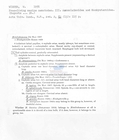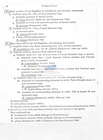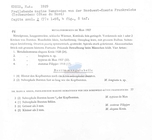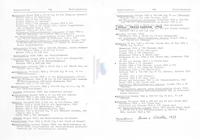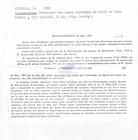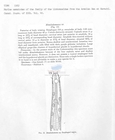Nemys taxon details
Metalinhomoeus de Man, 1907
2476 (urn:lsid:marinespecies.org:taxname:2476)
accepted
Genus
Monhysteriella Kreis, 1929 · unaccepted > superseded combination
- Species Metalinhomoeus bifidosetus Leduc & Zhao, 2023
- Species Metalinhomoeus biformis Juario, 1974
- Species Metalinhomoeus biratus Vitiello, 1969
- Species Metalinhomoeus breviseta Schuurmans Stekhoven, 1950
- Species Metalinhomoeus effilatus Schuurmans Stekhoven, 1942
- Species Metalinhomoeus falklandiae Allgén, 1959
- Species Metalinhomoeus filicaudatus (Allgén, 1930)
- Species Metalinhomoeus flagellicaudatus Schuurmans Stekhoven, 1935
- Species Metalinhomoeus gracilis (Kreis, 1929) Wieser, 1956
- Species Metalinhomoeus insularis Timm, 1967
- Species Metalinhomoeus karachiensis Timm, 1962
- Species Metalinhomoeus leptosoma Allgén, 1959
- Species Metalinhomoeus longiseta Kreis, 1929
- Species Metalinhomoeus maroeyensis Allgén, 1946
- Species Metalinhomoeus musaecauda Lorenzen, 1966
- Species Metalinhomoeus numidicus Aissa & Vitiello, 1977
- Species Metalinhomoeus obtusiceps Galtsova, 1976
- Species Metalinhomoeus octacanthus Bussau, 1993
- Species Metalinhomoeus paratypicus Vitiello, 1969
- Species Metalinhomoeus pareffilatus Wieser, 1956
- Species Metalinhomoeus parvasetosus Vitiello, 1969
- Species Metalinhomoeus retrosetosus Wieser, 1956
- Species Metalinhomoeus setosus Chitwood, 1951
- Species Metalinhomoeus sunderbanae Timm, 1967
- Species Metalinhomoeus tenuicaudatus Allgén, 1935
- Species Metalinhomoeus timmi Inglis, 1968
- Species Metalinhomoeus torosus Jensen & Gerlach, 1976
- Species Metalinhomoeus trichosoma Allgén, 1959
- Species Metalinhomoeus trinimirmecius Leduc & Zhao, 2023
- Species Metalinhomoeus tristis (Allgén, 1933)
- Species Metalinhomoeus typicus de Man, 1907
- Species Metalinhomoeus variabilis Murphy, 1965
- Species Metalinhomoeus zosterae Filipjev, 1918
- Species Metalinhomoeus elegans Kreis, 1928 accepted as Synonema obtusicaudatum (de Man, 1889) Gerlach, 1963 (synonym)
- Species Metalinhomoeus filiformis (de Man, 1907) accepted as Desmolaimus brasiliensis Gerlach, 1963 (Gerlach, S. A. (1963). Über freilebende Meeresnematoden. Revision der Linhomoeidae. Zool. Jb. Syst. Bd. 90: 599-658. note: Pro "Metalinhomoeus filiformis" sensu Gerlach 1957 p 165-166)
- Species Metalinhomoeus lineatus (Ditlevsen, 1919) Allgén, 1946 accepted as Paralinhomoeus lineatus (Ditlevsen, 1918) Allgén, 1959
- Species Metalinhomoeus meridionalis Cobb, 1930 accepted as Paralinhomoeus meridionalis (Cobb, 1930) Wieser, 1956 accepted as Linhomoeus meridionalis (Cobb, 1930) Wieser, 1956 (unaccepted > superseded combination)
- Species Metalinhomoeus obtusicaudatus Schuurmans Stekhoven, 1950 accepted as Synonema obtusicaudatum (de Man, 1889) Gerlach, 1963 (synonym)
- Species Metalinhomoeus gracilior Allgen, 1959 (uncertain > taxon inquirendum, Gerlach, S. A. (1963 p. 620). Über freilebende Meeresnematoden. Revision der Linhomoeidae. Zool. Jb. Syst. Bd. 90: 599-658. note: Pro "Metalinhomoeus filiformis" sensu Gerlach 1957 p 165-166)
- Species Metalinhomoeus microsetosus Allgén, 1953 (uncertain > taxon inquirendum, Gerlach, S. A. (1963 p. 620). Über freilebende Meeresnematoden. Revision der Linhomoeidae. Zool. Jb. Syst. Bd. 90: 599-658. note: Pro "Metalinhomoeus filiformis" sensu Gerlach 1957 p 165-166)
marine
de Man, J. G. (1907). Sur quelques espèces nouvelles ou peu connues de nématodes libres habitant les côtes de la Zélande. <em>Mém. Soc. zool. Fr.</em> 20: 33-90., available online at https://www.biodiversitylibrary.org/page/10132057#page/37/mode/1up
page(s): 81 [details]
page(s): 81 [details]
Nemys eds. (2024). Nemys: World Database of Nematodes. Metalinhomoeus de Man, 1907. Accessed at: https://www.nemys.ugent.be/aphia.php?p=taxdetails&id=2476 on 2024-09-23
Date
action
by
2004-12-21 15:54:05Z
created
db_admin
2006-09-25 06:54:45Z
changed
Martinez, Olga
original description
de Man, J. G. (1907). Sur quelques espèces nouvelles ou peu connues de nématodes libres habitant les côtes de la Zélande. <em>Mém. Soc. zool. Fr.</em> 20: 33-90., available online at https://www.biodiversitylibrary.org/page/10132057#page/37/mode/1up
page(s): 81 [details]
original description (of Monhysteriella Kreis, 1929) Kreis, H. A. (1929). Freilebende marine Nematoden von der Nordwest-Küste Frankreichs (Trébeurden Côtes du Nord). <em>Capita Zoologica.</em> II, 7: 1-98. [details] Available for editors [request]
[request]
basis of record Nemaslan: Biodiversity of Antarctic Nematodes (2004). (look up in IMIS) [details]
additional source Vincx, M. (1989). Seasonal fluctuations and production of nematode communities in the Belgian coastal zone of the North Sea. <em>Verhandelingen van het symposium "Invertebraten van Belgie".</em> 57-66. (look up in IMIS) [details] Available for editors [request]
[request]
additional source Brunel, P., L. Bosse & G. Lamarche. (1998). Catalogue of the marine invertebrates of the estuary and Gulf of St. Lawrence. <em>Canadian Special Publication of Fisheries and Aquatic Sciences, 126.</em> 405 pp. (look up in IMIS) [details] Available for editors [request]
[request]
additional source Neave, Sheffield Airey. (1939-1996). Nomenclator Zoologicus vol. 1-10 Online. <em>[Online Nomenclator Zoologicus at Checklistbank. Ubio link has gone].</em> , available online at https://www.checklistbank.org/dataset/126539/about [details]
additional source Various Authors (2000). Nematode filing cabinet of the Marine Biology Section Ugent - in combination with the NemasLan Ms-Access database (published on CD-Rom, 2000) (look up in IMIS) [details]
additional source Zeppilli, D. & R. Danovaro (2009). Meiofaunal diversity and assemblage structure in a shallow-water hydrothermal vent in the Pacific Ocean. Aquatic Biology. 5(1):75-84., available online at https://doi.org/10.3354/ab00140 [details] Available for editors [request]
[request]
additional source Verschelde, D.; Nicholas, W.; Vincx, M. (2006). A Review of the Genera Croconema Cobb, 1920 and Pseudochromadora Daday, 1899 (Nematoda, Desmodoroidea): New Species from the Coasts of Kenya and Australia. <em>Hydrobiologia.</em> 571, 17-40. (look up in IMIS) [details]
additional source Timm, R. W. (1962). Marine nematodes of the family Linhomoeidae from the Arabian Sea at Karachi. <em>Can. J. Zool.</em> 40: 165-178. [details] Available for editors [request]
[request]
additional source Jensen, P. (1983). Meiofaunal abundance and vertical zonation in a sublittoral soft bottom, with a test of the Haps corer. <em>Marine Biology.</em> 74: 319-326. [details] Available for editors [request]
[request]
additional source Dando, P. R.; Austen, M. C.; Burke, Jr. R. A.; Kendall, M. A.; Kennicutt, II M. C.; Judd, A. G.; Moore, D. C.; O'Hara, S. C. M.; Schmaljohann, R.; Southward, A. J. (1991). Ecology of a North Sea pockmark with an active methane seep. <em>Marine Ecology Progress Series.</em> 70: 49-63. [details] Available for editors [request]
[request]
additional source Da Rocha, C. M. C.; Venekey, V.; Bezerra, T. N. C.; Souza, R. B. (2006). Phytal marine nematode assemblages and their relation with the macrophytes structural complexity in a Brazilian tropical rocky beach. <em>Hydrobiologia.</em> 553:219-230. [details] Available for editors [request]
[request]
additional source Decraemer, W.; Coomans, A. (1978). Scientific Report on the Belgian Expedition to The Great Barrier Reef in 1967. Nematodes XII. Ecological Notes on the Nematode Fauna in and around Mangroves on Lizard Island. <em>Aust. J. Mar. Freshwater Res.</em> 29, 497-508. (look up in IMIS), available online at https://doi.org/10.1071/MF9780497 [details] Available for editors [request]
[request]
additional source Gerlach, S. A. (1977). Attraction to decaying organisms as a possible cause for patchy distribution of nematodes in a Bermuda beach. <em>Ophelia.</em> 16 (2): 151-165. [details] Available for editors [request]
[request]
additional source Gheskiere, T. (2000). Structurele diversiteit van nematodengemeenschappen van de Bligh Bank (Zuidelijke Bocht van de Noordzee). [details] Available for editors [request]
[request]
additional source Jensen, P. (1986). The nematode fauna in the sulphide-rich brine seep and adjacent bottoms of the East Flower Garden, NW Gulf of Mexico. II. Monhysterida. <em>Zoologica Scripta.</em> 15(1): 1-11. (look up in IMIS) [details] Available for editors [request]
[request]
additional source Commito, J.A. & G. Tita. (2002). Differential dispersal rates in an intertidal meiofauna assemblage. <em>Journal of Experimental Marine Biology and Ecology.</em> 268(2): 237-256. [details] Available for editors [request]
[request]
additional source Gobin, J. F. (2007). Free-living marine nematodes of hard bottom substrates in Trinidad and Tobago, West Indies. <em>Bulletin of Marine Science.</em> 81(1): 73–84. [details]
additional source Austen, M. C.; Widdicombe, S. (1998). Experimental evidence of effects of the heart urchin Brissopsis lyrifera on associated subtidal meiobenthic nematode communities. <em>Journal of Experimental Marine Biology and Ecology.</em> 222: 219-238. [details] Available for editors [request]
[request]
additional source Miljutin, D. M.; Gad, G.; Miljutina, M. M.; Mokievsky, V. O.; Fonseca-Genevois, V.; Esteves, A. M. (2010). The state of knowledge on deep-sea nematode taxonomy: how many valid species are known down there?. <em>Marine Biodiversity.</em> 40(3): 143-159., available online at https://doi.org/10.1007/s12526-010-0041-4 [details] Available for editors [request]
[request]
additional source Vanaverbeke, J.; Gheskiere, T.; Steyaert, M.; Vincx, M. (2002). Nematode assemblages from subtidal sandbanks in the Southern Bight of the North Sea: effect of small sedimentological differences. <em>Journal of Sea Research.</em> 48(3): 197-207. (look up in IMIS), available online at https://doi.org/10.1016/s1385-1101(02)00165-x [details] Available for editors [request]
[request]
additional source Van Gaever, S.; Moodley, L.; De Beer, D.; Vanreusel, A. (2006). Meiobenthos at the Arctic Håkon Mosby Mud Volcano, with a parental-caring nematode thriving in sulphide-rich sediments. <em>Marine Ecology Progress Series.</em> 321: 143-155., available online at https://doi.org/10.3354/meps321143 [details] Available for editors [request]
[request]
additional source Van Gaever, S.; Olu, K.; Derycke, S.; Vanreusel, A. (2009). Metazoan meiofaunal communities at cold seeps along the Norwegian margin: Influence of habitat heterogeneity and evidence for connection with shallow-water habitats. <em>Deep Sea Research Part I: Oceanographic Research Papers.</em> 56(5): 772-785., available online at https://doi.org/10.1016/j.dsr.2008.12.015 [details] Available for editors [request]
[request]
additional source Van Gaever, S.; Raes, M.; Pasotti, F.; Vanreusel, A. (2009). Spatial scale and habitat-dependent diversity patterns in nematode communities in three seepage related sites along the Norwegian Sea margin. <em>Marine Ecology.</em> 31(1): 66-77., available online at https://doi.org/10.1111/j.1439-0485.2009.00314.x [details] Available for editors [request]
[request]
additional source Venekey, V.; Fonseca-Genevois, V.; Santos, P. J. P. (2010). Biodiversity of free-living marine nematodes on the coast of Brazil: a review. <em>Zootaxa.</em> 2568: 39–66. [details] Available for editors [request]
[request]
additional source Vincx, M. (1989). Free-living marine nematodes from the southern bight of the North sea. <em>Mededelingen van de Koninklijke Academie voor Wetenschappen, Letteren en Schone Kunsten van België Academia Analecta.</em> 51 (1): 39-70. (look up in IMIS) [details] Available for editors [request]
[request]
additional source Shirayama, Y. (1992). Studies of meiofauna collected from the Iheya Ridge during the dive 541 of the "SHINKAI 2000". <em>Proc. JAMSTEC symp. deep Sea Research.</em> 8, 287-291. [details] Available for editors [request]
[request]
additional source Integrated Taxonomic Information System (ITIS). , available online at http://www.itis.gov [details]
additional source Vincx, M.; Meire, P.; Heip, C. (1990). The distribution of Nematodes communities in the Southern Bight of the North Sea. <em>Cah. Biol. Mar.</em> 31:107-129. (look up in IMIS) [details] Available for editors [request]
[request]
toxicology source Vincx, M.; Heip, C.H.R. (1987). The use of meiobenthos in pollution monitoring studies: a review. <em>CM Documents - ICES.</em> (E33L:1166). ICES: [s.l.]. 18 pp. (look up in IMIS) [details]
ecology source Soetaert, K.. M. Vinckx, J. Wittoeck & M.Tulkens. (1995). Meiobenthic distribution and nematode community structure in five European estuaries. <em>Hydrobiologia.</em> 311: 185-206. (look up in IMIS) [details] Available for editors [request]
[request]
ecology source Raes, M.; De Troch, M.; Ndaro, S. G. M.; Muthumbi, A.; Guilini, K.; Vanreusel, A. (2007). The structuring role of microhabitat type in coral degradation zones: a case study with marine nematodes from Kenya and Zanzibar. <em>Coral Reefs.</em> 26 (1): 13-126. [details] Available for editors [request]
[request]
ecology source Vanreusel, A., M. Vincx, D. Van Gansbeke & W. Gijselinck, W. (1992). Structural analysis of the meiobenthos communities of the shelf break area in two stations of the Gulf of Biscay (N.E. Atlantic). <em>Belgian Journal of Zoology.</em> 122(2):185-202. (look up in IMIS) [details] Available for editors [request]
[request]
page(s): 81 [details]
original description (of Monhysteriella Kreis, 1929) Kreis, H. A. (1929). Freilebende marine Nematoden von der Nordwest-Küste Frankreichs (Trébeurden Côtes du Nord). <em>Capita Zoologica.</em> II, 7: 1-98. [details] Available for editors
basis of record Nemaslan: Biodiversity of Antarctic Nematodes (2004). (look up in IMIS) [details]
additional source Vincx, M. (1989). Seasonal fluctuations and production of nematode communities in the Belgian coastal zone of the North Sea. <em>Verhandelingen van het symposium "Invertebraten van Belgie".</em> 57-66. (look up in IMIS) [details] Available for editors
additional source Brunel, P., L. Bosse & G. Lamarche. (1998). Catalogue of the marine invertebrates of the estuary and Gulf of St. Lawrence. <em>Canadian Special Publication of Fisheries and Aquatic Sciences, 126.</em> 405 pp. (look up in IMIS) [details] Available for editors
additional source Neave, Sheffield Airey. (1939-1996). Nomenclator Zoologicus vol. 1-10 Online. <em>[Online Nomenclator Zoologicus at Checklistbank. Ubio link has gone].</em> , available online at https://www.checklistbank.org/dataset/126539/about [details]
additional source Various Authors (2000). Nematode filing cabinet of the Marine Biology Section Ugent - in combination with the NemasLan Ms-Access database (published on CD-Rom, 2000) (look up in IMIS) [details]
additional source Zeppilli, D. & R. Danovaro (2009). Meiofaunal diversity and assemblage structure in a shallow-water hydrothermal vent in the Pacific Ocean. Aquatic Biology. 5(1):75-84., available online at https://doi.org/10.3354/ab00140 [details] Available for editors
additional source Verschelde, D.; Nicholas, W.; Vincx, M. (2006). A Review of the Genera Croconema Cobb, 1920 and Pseudochromadora Daday, 1899 (Nematoda, Desmodoroidea): New Species from the Coasts of Kenya and Australia. <em>Hydrobiologia.</em> 571, 17-40. (look up in IMIS) [details]
additional source Timm, R. W. (1962). Marine nematodes of the family Linhomoeidae from the Arabian Sea at Karachi. <em>Can. J. Zool.</em> 40: 165-178. [details] Available for editors
additional source Jensen, P. (1983). Meiofaunal abundance and vertical zonation in a sublittoral soft bottom, with a test of the Haps corer. <em>Marine Biology.</em> 74: 319-326. [details] Available for editors
additional source Dando, P. R.; Austen, M. C.; Burke, Jr. R. A.; Kendall, M. A.; Kennicutt, II M. C.; Judd, A. G.; Moore, D. C.; O'Hara, S. C. M.; Schmaljohann, R.; Southward, A. J. (1991). Ecology of a North Sea pockmark with an active methane seep. <em>Marine Ecology Progress Series.</em> 70: 49-63. [details] Available for editors
additional source Da Rocha, C. M. C.; Venekey, V.; Bezerra, T. N. C.; Souza, R. B. (2006). Phytal marine nematode assemblages and their relation with the macrophytes structural complexity in a Brazilian tropical rocky beach. <em>Hydrobiologia.</em> 553:219-230. [details] Available for editors
additional source Decraemer, W.; Coomans, A. (1978). Scientific Report on the Belgian Expedition to The Great Barrier Reef in 1967. Nematodes XII. Ecological Notes on the Nematode Fauna in and around Mangroves on Lizard Island. <em>Aust. J. Mar. Freshwater Res.</em> 29, 497-508. (look up in IMIS), available online at https://doi.org/10.1071/MF9780497 [details] Available for editors
additional source Gerlach, S. A. (1977). Attraction to decaying organisms as a possible cause for patchy distribution of nematodes in a Bermuda beach. <em>Ophelia.</em> 16 (2): 151-165. [details] Available for editors
additional source Gheskiere, T. (2000). Structurele diversiteit van nematodengemeenschappen van de Bligh Bank (Zuidelijke Bocht van de Noordzee). [details] Available for editors
additional source Jensen, P. (1986). The nematode fauna in the sulphide-rich brine seep and adjacent bottoms of the East Flower Garden, NW Gulf of Mexico. II. Monhysterida. <em>Zoologica Scripta.</em> 15(1): 1-11. (look up in IMIS) [details] Available for editors
additional source Commito, J.A. & G. Tita. (2002). Differential dispersal rates in an intertidal meiofauna assemblage. <em>Journal of Experimental Marine Biology and Ecology.</em> 268(2): 237-256. [details] Available for editors
additional source Gobin, J. F. (2007). Free-living marine nematodes of hard bottom substrates in Trinidad and Tobago, West Indies. <em>Bulletin of Marine Science.</em> 81(1): 73–84. [details]
additional source Austen, M. C.; Widdicombe, S. (1998). Experimental evidence of effects of the heart urchin Brissopsis lyrifera on associated subtidal meiobenthic nematode communities. <em>Journal of Experimental Marine Biology and Ecology.</em> 222: 219-238. [details] Available for editors
additional source Miljutin, D. M.; Gad, G.; Miljutina, M. M.; Mokievsky, V. O.; Fonseca-Genevois, V.; Esteves, A. M. (2010). The state of knowledge on deep-sea nematode taxonomy: how many valid species are known down there?. <em>Marine Biodiversity.</em> 40(3): 143-159., available online at https://doi.org/10.1007/s12526-010-0041-4 [details] Available for editors
additional source Vanaverbeke, J.; Gheskiere, T.; Steyaert, M.; Vincx, M. (2002). Nematode assemblages from subtidal sandbanks in the Southern Bight of the North Sea: effect of small sedimentological differences. <em>Journal of Sea Research.</em> 48(3): 197-207. (look up in IMIS), available online at https://doi.org/10.1016/s1385-1101(02)00165-x [details] Available for editors
additional source Van Gaever, S.; Moodley, L.; De Beer, D.; Vanreusel, A. (2006). Meiobenthos at the Arctic Håkon Mosby Mud Volcano, with a parental-caring nematode thriving in sulphide-rich sediments. <em>Marine Ecology Progress Series.</em> 321: 143-155., available online at https://doi.org/10.3354/meps321143 [details] Available for editors
additional source Van Gaever, S.; Olu, K.; Derycke, S.; Vanreusel, A. (2009). Metazoan meiofaunal communities at cold seeps along the Norwegian margin: Influence of habitat heterogeneity and evidence for connection with shallow-water habitats. <em>Deep Sea Research Part I: Oceanographic Research Papers.</em> 56(5): 772-785., available online at https://doi.org/10.1016/j.dsr.2008.12.015 [details] Available for editors
additional source Van Gaever, S.; Raes, M.; Pasotti, F.; Vanreusel, A. (2009). Spatial scale and habitat-dependent diversity patterns in nematode communities in three seepage related sites along the Norwegian Sea margin. <em>Marine Ecology.</em> 31(1): 66-77., available online at https://doi.org/10.1111/j.1439-0485.2009.00314.x [details] Available for editors
additional source Venekey, V.; Fonseca-Genevois, V.; Santos, P. J. P. (2010). Biodiversity of free-living marine nematodes on the coast of Brazil: a review. <em>Zootaxa.</em> 2568: 39–66. [details] Available for editors
additional source Vincx, M. (1989). Free-living marine nematodes from the southern bight of the North sea. <em>Mededelingen van de Koninklijke Academie voor Wetenschappen, Letteren en Schone Kunsten van België Academia Analecta.</em> 51 (1): 39-70. (look up in IMIS) [details] Available for editors
additional source Shirayama, Y. (1992). Studies of meiofauna collected from the Iheya Ridge during the dive 541 of the "SHINKAI 2000". <em>Proc. JAMSTEC symp. deep Sea Research.</em> 8, 287-291. [details] Available for editors
additional source Integrated Taxonomic Information System (ITIS). , available online at http://www.itis.gov [details]
additional source Vincx, M.; Meire, P.; Heip, C. (1990). The distribution of Nematodes communities in the Southern Bight of the North Sea. <em>Cah. Biol. Mar.</em> 31:107-129. (look up in IMIS) [details] Available for editors
toxicology source Vincx, M.; Heip, C.H.R. (1987). The use of meiobenthos in pollution monitoring studies: a review. <em>CM Documents - ICES.</em> (E33L:1166). ICES: [s.l.]. 18 pp. (look up in IMIS) [details]
ecology source Soetaert, K.. M. Vinckx, J. Wittoeck & M.Tulkens. (1995). Meiobenthic distribution and nematode community structure in five European estuaries. <em>Hydrobiologia.</em> 311: 185-206. (look up in IMIS) [details] Available for editors
ecology source Raes, M.; De Troch, M.; Ndaro, S. G. M.; Muthumbi, A.; Guilini, K.; Vanreusel, A. (2007). The structuring role of microhabitat type in coral degradation zones: a case study with marine nematodes from Kenya and Zanzibar. <em>Coral Reefs.</em> 26 (1): 13-126. [details] Available for editors
ecology source Vanreusel, A., M. Vincx, D. Van Gansbeke & W. Gijselinck, W. (1992). Structural analysis of the meiobenthos communities of the shelf break area in two stations of the Gulf of Biscay (N.E. Atlantic). <em>Belgian Journal of Zoology.</em> 122(2):185-202. (look up in IMIS) [details] Available for editors
 Present
Present  Inaccurate
Inaccurate  Introduced: alien
Introduced: alien  Containing type locality
Containing type locality

